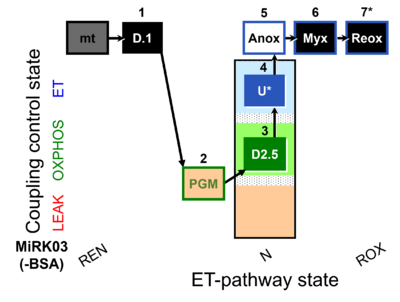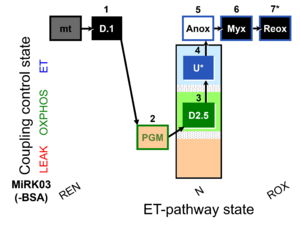From Bioblast
Description
Reference: A: protocol for simultaneous determination of O2 flux and NADH autofluorescence in mitochondrial preparations (isolated mitochondria, tissue homogenate and permeabilized cells)- SUIT-006
SUIT number: D082_mt;1D.1;2PGM;3D2.5;4U;5Anox;6Myx;7Reox
O2k-Application: NADH
Communicated by Grings M, Cardoso Luiza HD (last update 2023-11-30)
Representative traces
File:SUIT-034 NADH mt D082.png File:SUIT-034 NADH mt D082.png
Steps and respiratory states
| Step | State | Pathway | Q-junction | Comment - Events (E) and Marks (M) |
|---|---|---|---|---|
| mt | REN | mt | ||
| 1D.1 | mt;1D.1
| |||
| 2PGM | PGM | N | CI | mt;1D.1;2PGM
|
| 3D2.5 | PGMP | N | CI | mt;1D.1;2PGM;3D2.5
|
| 4U | PGME | N | CI | mt;1D.1;2PGM;3D2.5;4U
|
| 5Anox | N | CI | mt;1D.1;2PGM;3D2.5;4U;5Anox | |
| 6Myx | N | CI | mt;1D.1;2PGM;3D2.5;4U;5Anox;6Myx
| |
| 7Reox | ROX | mt;1D.1;2PGM;3D2.5;4U;5Anox;6Myx;7Reox |
- Bioblast links: SUIT protocols - >>>>>>> - Click on [Expand] or [Collapse] - >>>>>>>
- Coupling control
- Pathway control
- Main fuel substrates
- » Glutamate, G
- » Glycerophosphate, Gp
- » Malate, M
- » Octanoylcarnitine, Oct
- » Pyruvate, P
- » Succinate, S
- Main fuel substrates
- Glossary
Strengths and limitations
Compare SUIT protocols
Chemicals and syringes
| Step | Chemical(s) and link(s) | Comments |
|---|---|---|
| 1D.1 | ADP (D) | 40 mM stock solution. |
| 2PGM | Pyruvate (P), Glutamate (G), and Malate (M) | |
| 3D2.5 | ADP (D) | 500 mM stock solution. |
| 4U | SF6847 | We do not recommend using any other uncoupler, e.g. Carbonyl cyanide m-chlorophenyl hydrazone, CCCP (U), due to the chemical background effect on fluorescence. |
| 5Anox | The O2 concentration in the O2k-chamber can be decreased by N2 or H2 injection to reach faster anoxia, see: Setting the oxygen concentration. | |
| 6Myx | Myxothiazol | We do not recommend using any other inhibitor of complex III, e.g. Antimycin A (Ama), due to the chemical background effect on fluorescence. |
| 7Reox | Reoxygenation can be performed by opening the chamber, see: Open chamber. |
- Suggested stock concentrations are shown in the specific DL-Protocol.



